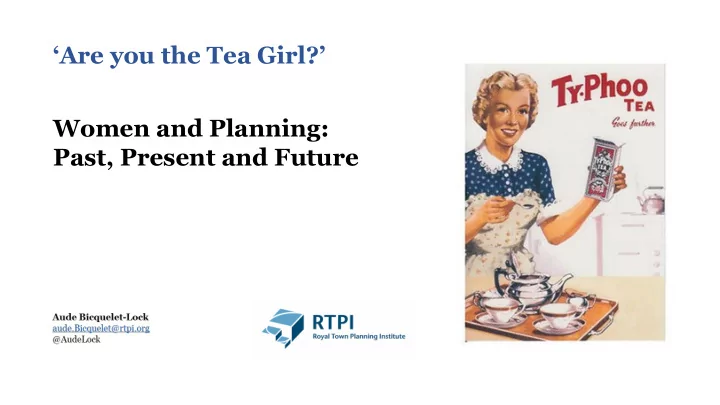

‘Are you the Tea Girl?’ Women and Planning: Past, Present and Future
Background 2017 RTPI membership survey Relatively important % of female planners have faced barriers to their professional advancement. ▪ Gender – 24% of female respondents and 2% of male respondents. ▪ Lack of family-friendly employer policies – 14% of female respondents and 2% of male respondents
Background “Regarding career progression, I do find it quite disheartening that with a BA and MA with Distinction, RTPI membership and having almost 12 years experience I am still essentially no nearer achieving the career I would like. I am sure that I would have had more chance of progression were I not female. Even in this job (…) I have been asked directly if I am the 'tea girl'.” Female planner, 2017 RTPI membership survey
Women and Planning: Past Present and Future (2019) Part 1: Professional journey of female planners. Part 2: Impact of gender mainstreaming on planning policies. Part 3: Future challenges facing the next generation of planners.
Women and Planning: Past Present and Future (2019) 52 Cases 50 Women 41 Questionnaires 2 Men 11 Interviews 6 Countries
Women and Planning: Past Present and Future (2019)
Women and Planning: Past Present and Future (2019) ▪ Exploratory rather than confirmatory ▪ Springboard towards developing hypotheses ▪ Experiences vs. numbers ▪ Pilot Project - Equality Diversity & Inclusivity Action Plan
The Good The Bad The Ugly
‘The Good’ “[Where I work…] female colleagues are promoted just as frequently as the few male colleagues I have. I believe that the male dominated leadership is a hangover from previous, less enlightened times.” Female planner, 25-34 years old, New Zealand, Public Sector
‘The Good’ “I do not consider that gender has acted as a barrier to my professional advancement to date. My current employers are family-friendly which has made working whilst caring for two young children manageable”. Female planner, 25-34 years old, England, Public Sector
‘The Good’ ? “I think my gender has worked in my favour because the majority of agencies I have worked for have been dominated by mature males – within their executive. I have no doubt they hire on the basis of someone they can relate to”. Male planner, 55-64 years old, New Zealand, Public Sector
‘ The bad’
‘The bad’ “I have been told outright in the past that I would not be selected for a promotion because I would “probably just have a baby anyway”. Female planner, 35-44 years old, Canada, Private Sector
‘The bad’
‘The bad’ “I don’t feel that gender had any effect on my career until I had children, but the impact of two maternity leaves was significant (…). In both instances, the manager (a woman) had decided that I wouldn’t be able to cope with my own job following my return to work”. Female planner, 35-44 years old, Scotland, Public Sector background
‘The bad’
‘The ugly’ “I’ve had people pat me on the head, shush me and assume they know what I am going to say (…). I’ve had colleagues give inappropriate hugs or get too close and you’ve just had to suck it up and deal with it .” Female planner, 45-54 years old, England, Public Sector
‘The very ugly’…
Preliminary Findings Summary
Preliminary Findings: Summary “Yes , discrimination, sexism, racism persists .” Female planner, 45-54 years old, Canada, mixed background
Preliminary Findings: Summary
Preliminary Findings: Summary I believe there is very much a ‘ boys club ’ culture which I view as being a potential barrier (…). Things like golf days, rugby events etc. have made me feel like I cannot partake in certain things (…). I have often had the experience of being I still feel that as women we take the talked over (…). M en don’t realise what they lion’s share of childcare etc. and this are doing it, and sometimes women are conflicts with corporate life. scared to point it out for fear of being seen as an ‘angry woman’ . Children rather than gender per se are probably Unfortunately, a lot of women who made it the issue today in terms of career progression (…) suffer from the ‘ queen bee syndrome’ . They Overall, I think that class is now a more are more critical of other women to keep them significant barrier to entry to planning or similar out, they also manipulate issues around gender professions than gender ( Male respondent ). equality to suit their own purposes.
Respondents’ Recommendations
Respondents’ recommendations “ Understanding first and foremost that there is an issue ” ▪ Equal pay ▪ Testing unconscious bias during interviews ▪ Monitoring the ‘office culture’ ▪ Setting up safe, confidential, and professional system for reporting sexist behaviours ▪ Encouraging mentorship and networking activities
Respondents’ recommendations “ Serious, practical and above all genuine actions to change things” ▪ Offering career development & leadership trainings to women ▪ Implementing family and carer-friendly policies ▪ Implementing flexible working hours ▪ Improving support before, during, upon return from ML ▪ Carefully monitoring managers’ behaviours when women are most at risk (e.g. upon return from ML; when promotion opportunities arise; at events…)
Respondents’ recommendations ▪ Publishing examples of good practices in the workplace ▪ Appointing dedicated senior members of staff to monitor Ethics, Equality and Diversity issues ▪ Taking transparency and accountability seriously (e.g. defining KPI; tracking and publishing progress across organisations) ▪ Encouraging women to take leadership roles (and ‘defining’ leadership) ▪ Encouraging macro and micro behavioural shifts (challenging language and ‘masculine norms’)
Respondents’ Recommendations “I am a proponent of the importance of micro-level social interactions to undermine implicit gender barriers. For example, I refuse to make tea in a meeting, so as to not take up a traditional serving female role .” Female planner, 35-44 years old, England, Private Sector
Thank you And a very warm thank you to all the participants in this study!
Recommend
More recommend